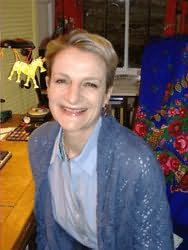Last changed
4 Dec 2016 ............... Length about 1,000 words (10,000 bytes).
(Document started on 4 Aug 2010.)
This is a WWW document maintained by
Steve Draper, installed at http://www.psy.gla.ac.uk/~steve/kgrant.html.
You may copy it.
How to refer to it.
Web site logical path:
[www.psy.gla.ac.uk]
[~steve]
[this page]
Katie Grant
By
Steve Draper,
Department of Psychology,
University of Glasgow.
 ext. 7252 Room F122, Sir Alwyn Williams Building (computing science)
ext. 7252 Room F122, Sir Alwyn Williams Building (computing science)
Room 535 ext.1970, Education building
This is my page to hold pointers to, and perhaps comments on, Katie Grant.
Her personal university-hosted page
[
page
edit-it
admin-login
] Now being taken down.
A publisher-organised page
Other refs to Katie Grant
Hounslow Chronicle
Penguin books
Advancing Academic Writing project
new Moodle page with the materials of the Advancing Academic
Writing project
(funded by two successive LTDF grants titled "Writing for results"):
Outer page
Short cut into psych-specific exercises
old Moodle with the materials of the Advancing Academic
Writing project
(funded by two successive LTDF grants titled "Writing for results").
Arts writing project test
My brief pointer to the project
My slightly bigger
pointer to the project
Wingate and literacies as one angle on this.
The key features of AAW
- All help about is writing is in one place.
(Not a dozen different guides to spelling, report formats, referencing styles,
how to write a logical paragraph, ...)
- Active exercises (with feedback). (Not passive reading dictionaries,
written feedback, ...; but doing things.)
- Discipline specific
- Rules for writing are different in each discipline (formats,
style, .....)
- Based on actual observed recent student errors in that
discipline. (Not bad writing that some other person in some other
institution and discipline might commit.)
- Exercises /examples are all in that subject area: immediately
familiar and relevant to the student.
Other stuff; ToDo
I need to create:
[done] Page summarising why the writing project should attract adopters
My own large page on it OR trust Katie's pages and sites
Page on related projects: math, graphs, reading
Web notes for a future reading project
Just as advancing writing, so for advancing reading. Are we reading as well as
we should/could? and other thoughts.
What might an Advancing Reading Project involve?
- "Speed reading" and being able to vary one's reading speed to suit the
nature of the material.
- Timing: Jane Davis is clear about how the seed at which you process a
text (silent reading vs. listening) changes how you respond to it.
And that could relate to "catastrophic thinking" vs. mindfulness.
- Reading aloud to others. Reading as social, not private.
- Reading aloud to one's partner.
- Telling stories. Reading is an offshoot of story-telling.
- Perhaps this connects with (could be combined with) an initiative
to promote (scaffold) academic conversation: allow others' differences
in views, responses, to stimulate your own thinking.
- Especially, telling i.e. composing one's own story(s) as an essential
part of human thinking and well-being.
- Well-being depends on being connected; on spending time in meaningful
interchange with other people. Peter Owen Jones on St.Francis.
- Keith Oatley on George Eliot, and how reading
novels is an education of one's emotions and understanding of emotions.
This idea is now dealt with on another page.
- Oatley, K., & Olson, D. R. (2010). Cues to the imagination in memoir, science,
and fiction. Review of General Psychology, 12, 56-64.
- Mar, R. A., Oatley, K., & Peterson, J. B. (2009). Exploring the link between
reading fiction and empathy: Ruling out individual differences and examining
outcomes. Communications: The European Journal of Communication, 34, 407-428.
- Oatley, K. (2009). Communications to self and others: Emotional experience and
its skills. Emotion Review, 1, 206-213.
- Djikic, M., Oatley, K., Zoeterman, S., & Peterson, J. (2009b). Defenceless
against art? Impact of reading fiction emotion in avoidantly attached
individuals. Journal of Research in Personality, 43, 14-17.
- Djikic, M., Oatley, K., Zoeterman, S., & Peterson, J. (2009a). On being moved
by art: How reading fiction transforms the self. Creativity Research Journal,
21, 24-29.
- Oatley, K. & Djikic, M. (2008) Writing as thinking. Review of General
Psychology, 12, 9-27.
- Mar, R.A. & Oatley, K. (2008). The function of fiction is the abstraction and
simulation of social experience. Perspectives on Psychological Science, 3,
173-192.
- Mar, R.A., Oatley, K., Hirsh, J., dela Paz, J., & Peterson, J.B. (2006).
Bookworms versus nerds: The social abilities of fiction and non-fiction
readers. Journal of Research in Personality, 40, 694-712.
- Oatley, K. (1999). Why fiction may be twice as true as fact: Fiction as
cognitive and emotional simulation. Review of General Psychology, 3, 101-117.
- Oatley, K. (1998). Emotion. The Psychologist, 11, 285-288.
Jane Davis and her project
The Independent article that alerted me
Jane Davis herself:
Jane Davis janedavis AT thereader.org.uk
Her organisation: The Reader Organisation
Her intervention: Get Into Reading
and here
Their publications
Their magazine;
their blog;
the wikipedia page on their magazine
The-shakespeared-brain
Using it with asylum seekers
A 2 year MA course
"Reading in Practice".
The Reading in Practice MA is the first of its kind in
the country. It invites open-minded investigation into the role of reading in
relation to health - in the broadest sense of that word
Jude Robinson
Hodge S, Robinson J and Davis P (2007)
Reading between the lines: the experiences of taking part in a
community reading project.
Medical Humanities vol.33 pp.100-104
Jane
Davis paper in Lancet 2009
"Enjoying and enduring: groups reading aloud for wellbeing"
I'm told this should be seen as a form of bibliotherapy (cf. music therapy,
and art therapy). And
Human Libraries events.
Web site logical path:
[www.psy.gla.ac.uk]
[~steve]
[this page]
[Top of this page]
![]() ext. 7252 Room F122, Sir Alwyn Williams Building (computing science)
ext. 7252 Room F122, Sir Alwyn Williams Building (computing science)